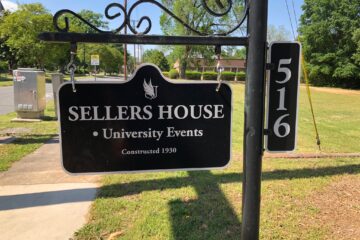Todd Hagins, a former federal prosecutor, joined President Serna’s office on February 16 as the university’s chief legal representative and advisor. From providing legal advice to the university to working closely with the Title IX office and process, the role of General Counsel comes with a number of responsibilities.
According to a press release on Winthrop University’s website, Hagins will give expert advice on matters related to workplace safety and general employment, as well as with Title IX, The Americans with Disabilities Act and student discipline. He will also work with the Office of Procurement to assess the legality of contracts, leases and memorandums, and will take over as the Freedom of Information Act (FOIA) officer.
Departments he will interact with include Title IX coordinator, dean of students, vice president for student affairs, the chief of police, the president and more.
It is unclear what his salary under this position is.
He has spent more than 20 years working with nonprofits, law enforcement and in higher education.
His years of experience providing legal counsel, as well as redesigning and establishing processes before being hired at Winthrop gives him hope that his insight will improve the processes that interact with the General Counsel’s office, which will help faculty and staff bring a better educational experience to students.
He said the “hallmark” of a successful general counsel is that your name is forgotten, but the impact of your decisions is undeniable.
Hagins also said a significant portion of his expertise involves reading and evaluating contracts, and likens the duty to reading an IKEA instruction manual.
“Imagine if you really liked your job, but every day you had to read and understand a 20-page packet of IKEA instructions. In my brief time at Winthrop I have met some exceptional, dedicated staff members who love their jobs, but I imagine most don’t want to have to understand the IKEA instruction book; they just want to do their primary job whether that is to get a piece of equipment for a computer science professor or a piece of equipment for the gym. Too often, contract processes ask staff members to read and understand the impact of a 20-page contract,” Hagins said.
“Luckily, I enjoy reading 20-page contracts. So by me focusing on improving that process, as well as some others, Winthrop staff can focus on adding value to the Winthrop experience for others.”
Hagins earned a bachelor’s in political science and religion at Furman University and his law degree from the University of South Carolina School of Law.
A week before entering his undergraduate program, his father, who had worked at a cotton mill for more than 35 years, had to medically retire. He thought he may have to postpone going to college to get his finances in order, but he was able to acquire enough funds from working, money from his parents and from financial aid to graduate. He was the first person in his family to do so.
He likes to say he learned two things from the challenge, “First, don’t work in a cotton mill. That will destroy your lungs. Second, there are people in every organization who have a passion for helping others,” he said. “ Without those people at Furman, I know I would not have gone to that school or graduated when I did.”
Though he always knew he wanted to be a lawyer, this made him realize that he could use his profession to help people. This mission led him to go on to work with government agencies and nonprofit organizations.
Hagins started his legal career serving as a legal clerk for Justice E.C. Bennett on the South Carolina Supreme Court. He had previously interned with Federal Judge Matthew Perry, who was close to Martin Luther King Jr.
Both Judge Perry and Justice Bennett emphasized the importance of ethical conduct to uphold the legal profession.
6 months after joining the District Attorney’s office, Hagins found himself arguing his first case in front of Judge Perry, representing the United States. It was when he sat down after giving his opening statement that he knew for sure that he had made the right career choice.
He was hired as a federal prosecutor during his clerkship and was mentored by Scott Schools, who advocated for ethics, as well as empathy when tasked with problem-solving.
Hagins said that Schools, who is now the Chief Compliance Officer for Uber, was known to say that “Attorneys too often say “No” without understanding what someone is really asking because it’s always easier to say no than to take the time to solve a problem.”
Another colleague he has worked with was United States Attorney Reggie Lloyd, the first Black U.S. attorney. Lloyd asked him to join the South Carolina Law Enforcement Division (SLED) upon being named its director in 2008.
Following his time at SLED, he worked at a non-profit. He has spent the last 10 years serving as an attorney and Director of Compliance at the University of South Carolina.
When applying for his position at Winthrop, he said he was “struck by the passion that President Serna and his leadership team have for addressing the opportunities that Winthrop faces in a post-pandemic environment.”




